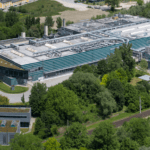Suzano, the world’s largest pulp producer, officially inaugurated the world’s largest single-line pulp mill in Ribas do Rio Pardo, Mato Grosso do Sul, on Thursday December 5.
The ceremony was attended by the President of Brazil, Luiz Inácio Lula da Silva; the Vice President and Minister of Development, Industry, Commerce and Services, Geraldo Alckmin; and the CEO of Suzano, Beto Abreu, as well as representatives from the federal, state and municipal governments, local authorities, and executives from Suzano.
With capacity to produce 2.55 million tonnes of pulp per year, the project is the result of a total investment of R$22.2 billion (~U$4.3 billion) , of which R$15.9 billion (~U$3.1 billion) was allocated to the construction of the mill and R$6.3 billion (~U$1.2 billion) dedicated to areas such as developing outbound logistics and the forestry base. This marks the largest investment in Suzano’s 100-year history, and represents one of the largest private investments in Brazil in recent years.
During the ceremony, President Luiz Inácio Lula da Silva emphasized the importance of responsible private investment to the country’s development: “We can only reap what we sow if we plant properly, clean properly, fertilize properly and water properly. This makes a forest grow,” Lula said. “The Brazilian economy is expected to grow by 3.5% this year, with the potential to reach 4%. It is one of the largest growth rates among all the countries in the world,” he added.
Reflecting on Suzano’s ambitious goals for promoting diversity, equity, and inclusion, Lula emphasized the importance of this agenda in fostering a more equitable society. In Ribas do Rio Pardo, Suzano’s workforce includes 609 women, with 448 working in the forestry sector and 161 in the industrial sector.
The construction of the Ribas do Rio Pardo mill was first announced in May 2021. At the peak of the construction, it created more than 10,000 direct jobs, with a total of more than 45,000 people involved throughout its duration. The mill began operations on July 21 of this year and currently employs approximately 3,000 people working across industrial, forestry and logistics roles.
Positive outcomes
During the event, Beto Abreu, the CEO of Suzano, highlighted that the Ribas do Rio Pardo mill serves as a prime example of private investment delivering positive outcomes for both people and nature: “Over 45,000 people have worked here, and today, we generate 10,000 direct and indirect jobs in the region. This is the type of social impact that an investment of this scale brings to the country and the state. We have an industrial complex here that can generate all the energy this hub requires in a renewable and clean manner, with enough surplus to supply all the households in Mato Grosso do Sul. Moreover, Suzano plants 1.2 million trees a day and extracts more carbon from the atmosphere than it releases, serving as a tangible example of a sustainable industry,” stated the executive during the ceremony.
The Ribas do Rio Pardo unit will be self-sufficient in green energy production, with a surplus of approximately 180 megawatts (MW) on average, which will serve the satellite suppliers of the mill and contribute to the National Interconnected System (SIN). This energy from a renewable source is enough to power a city of up to 2 million inhabitants monthly.
With the start of operations at the new unit, Suzano’s installed pulp production capacity increased from 10.9 million to 13.5 million tonnes per year, representing an increase of over 20% in the company’s current pulp production. Suzano also has the capacity to produce 1.5 million tonnes annually of papers, including the lines of sanitary papers, printing and writing paper, and packaging, among other products that use pulp as a raw material.
The new unit also contributed to the increase in Suzano’s production capacity in Mato Grosso do Sul. The company now has three mills, with a total capacity of 5.8 million tonnes of pulp per year, which directly contributes to regional socioeconomic development.
The mill has the smallest structural average radius of the forest base among Suzano’s operations, totaling 65 km between the planting areas and the mill. This unique feature minimizes logistical costs and the environmental impact associated with the transportation of pulp and wood. 50% of wood transportation is conducted using hexatrains – supertrains that operate exclusively on the company’s private roads and can carry up to 250 tonnes of wood. This approach significantly reduces the use of fossil fuels and the emission of greenhouse gases.
To support the new mill, Suzano has a forest base of 599,000 hectares in Mato Grosso do Sul, with 143,000 hectares set aside exclusively for conservation. Furthermore, the company has invested in establishing two seedling nurseries, one in Campo Grande and another in Ribas do Rio Pardo, which have a total production capacity of 75 million eucalyptus seedlings per year.
Sustainable development
In line with its public commitment to support the sustainable development of Ribas do Rio Pardo and the surrounding region, Suzano has not only generated thousands of direct and indirect jobs and contributed significantly to the stimulation of the entire economic chain, but has also invested in improving the skills base of the local workforce. Over 1,300 individuals have been qualified for industrial, forestry, and logistics roles, and, in collaboration with Senai and Senac, 300 people have been trained for the local job market.
Suzano has also invested more than R$300 million in constructing new housing units and a medical center, improving local infrastructure, and supporting social projects. Through the Basic Environmental Plan (PBA) alone, R$57.3 million has been invested in 21 local projects focused on healthcare, education, social development, housing and public safety. The voluntary social projects totaled R$13.8 million invested in initiatives focused mainly on job and income generation in Ribas do Rio Pardo and the surrounding region.




